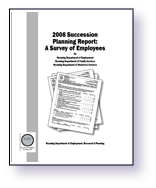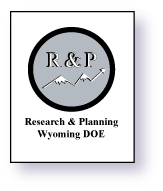Chapter 10: Interest in Training
by: Lisa L. Knapp, Research Analyst
In other chapters of this report an interest in career advancement has been identified by respondents as an issue of great importance. The following chapter analyzes the degree to which these employees are interested in both receiving and offering training to help attain these career advancement goals.
Willing to Learn
In all agencies, more than half of respondents in each age group indicated that they would be likely or very likely to be willing to learn others’ job duties (see Figure 1). This was also the case for respondents in each agency, especially for those younger than age 55. Those older than age 55, particularly in the Department of Family Services (DFS), were somewhat less likely to answer this question in the affirmative.
Similarly, a majority of respondents in all agencies and in each agency stated that they would be likely or very likely to be willing to attend management or other training for career advancement (see Figure 2). A greater proportion of those younger than age 55 answered this way in each agency compared to those older than age 55.
As shown in Figure 3, a majority of respondents in each agency stated that they would be likely or very likely to participate in a career advancement program if such a program existed. Again, a larger proportion of those younger than 55 responded this way than those age 55 or older.
The responses to these three questions indicated that there was a great amount of interest from employees, regardless of agency, in receiving training to advance in their jobs both in terms of learning the duties of others and in obtaining outside training. This was more often the case for workers younger than 55 who could potentially work for the state for several more years. However, at this time, we are unaware of any programs like this that are currently in use. It may be beneficial to the agencies involved in this study, in conjunction with a program to help advance employees to similar positions across agencies, to put into place some form of training program to help these employees advance.
Willing to Train Others
As with the questions regarding willingness to receive training, a vast majority of respondents indicated that they would be likely or very likely to be willing to train co-workers in their duties (see Figure 4). This was the case across all agencies and for all age groups. This suggests that not only are employees interested in being trained to advance in their jobs, but that they are probably willing to help each other accomplish this. Another possible approach would be for agency administration to set up specific programs to cross-train employees.

